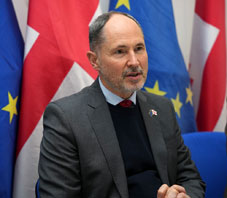EU Ambassador Criticizes Attacks on Journalists and EU-Georgia Relations

Herczynski highlighted the suspension of Georgia's EU accession process, stating that this crisis in relations is particularly striking given it coincides with the first anniversary of Georgia being granted EU candidate status. He lamented how the focus of media development had shifted from improving media standards to protecting journalists from physical and verbal aggression, persecution, and even torture.
The Ambassador condemned the Georgian government's attempts to silence the media, reinforcing the EU's firm stance in supporting independent journalism. Drawing on a statement by EU Foreign Affairs Chief Kaja Kallas, Herczynski reiterated that "democracies do not oppress opposition voices or curtail the freedom of media." He confirmed that while EU funding to the Georgian government has been halted, the EU would increase its support for civil society and independent media.
In his remarks, Herczynski praised journalists' courage and resilience, stressing the importance of their work in shaping public understanding of complex issues and underscoring that foreign diplomats rely on their reporting.
RSF Condemns Attacks on Journalists in Georgia Amid Protests and Police Brutality

RSF condemned the coordinated violence carried out by Georgian law enforcement, which has specifically targeted journalists covering the protests. High-profile attacks include those on reporters Guram Rogava and Mariam Nikuradze, both of whom sustained severe injuries. RSF has called on the European Union to take immediate action and launch an international investigation into these attacks to hold the perpetrators accountable.
In addition to the violence, RSF highlighted recent legislative amendments introduced by the Georgian government that restrict peaceful assemblies and give law enforcement greater power to target protesters and journalists. These changes include a ban on wearing masks, which are vital for journalists exposed to chemical agents. RSF warned that these measures, combined with the ongoing violence, signal a decline in Georgia's democracy and press freedom.
According to RSF, this situation underscores the growing authoritarian influence in Georgia, driven by political manipulation and alignment with Russian interests. The organization has called for urgent EU intervention to safeguard press freedom and democracy in the country.
